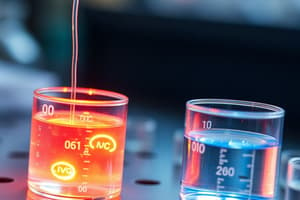Podcast
Questions and Answers
Which process involves passing an electric current through an electrolyte to drive non-spontaneous redox reactions?
Which process involves passing an electric current through an electrolyte to drive non-spontaneous redox reactions?
- Electrolysis (correct)
- Galvanic cell
- Oxidation-reduction reaction
- Electrochemical cell
In electrochemistry, what is the term for a reaction that involves both oxidation and reduction processes happening simultaneously?
In electrochemistry, what is the term for a reaction that involves both oxidation and reduction processes happening simultaneously?
- Redox reaction (correct)
- Neutralization reaction
- Single displacement reaction
- Decomposition reaction
What is the primary purpose of an electrochemical cell?
What is the primary purpose of an electrochemical cell?
- To produce electricity through chemical reactions (correct)
- To convert mechanical energy into electrical energy
- To store electrical charge in a capacitor
- To generate heat through exothermic reactions
What type of cell converts chemical energy into electrical energy and is commonly found in batteries?
What type of cell converts chemical energy into electrical energy and is commonly found in batteries?
Which of the following is NOT a product commonly produced by electrolysis?
Which of the following is NOT a product commonly produced by electrolysis?
Which phenomenon in electrochemistry involves the deterioration of metals due to chemical reactions with their environment?
Which phenomenon in electrochemistry involves the deterioration of metals due to chemical reactions with their environment?
What type of redox reactions occur in an electrolytic cell?
What type of redox reactions occur in an electrolytic cell?
Which type of electrochemical cell converts chemical energy into electrical energy?
Which type of electrochemical cell converts chemical energy into electrical energy?
What drives the redox reactions in a galvanic cell to generate voltage?
What drives the redox reactions in a galvanic cell to generate voltage?
In what industry is corrosion a significant issue due to equipment failure and increased costs?
In what industry is corrosion a significant issue due to equipment failure and increased costs?
What happens to a metal during a corrosion process?
What happens to a metal during a corrosion process?
What is the main purpose of an electrolytic cell?
What is the main purpose of an electrolytic cell?
Study Notes
Understanding Electrochemistry: Oxidation, Reduction, and Applications
Electrochemistry is the multidisciplinary science that combines chemistry and physics to study the interactions between electricity and chemical reactions, often occurring at the interface between electrodes and solutions. This branch of chemistry encompasses several important concepts, including oxidation-reduction reactions, electrolysis, electrochemical cells, Galvanic cells, and corrosion, which we will delve into below.
Oxidation-Reduction Reactions
At the core of electrochemistry lies the concept of oxidation and reduction reactions, which are commonly known as redox reactions. Oxidation and reduction occur simultaneously, and the balance of both processes results in a chemical equilibrium. In these reactions, electrons are transferred between chemical species, altering their oxidation states. Non-electrochemical redox reactions also occur in nature and everyday life, such as rusting iron or the conversion of glucose to energy in our cells.
Electrolysis
Electrolysis is a process in which electric current is passed through an electrolyte, causing chemical reactions to occur at the electrodes. This method is used to produce various chemicals, such as chlorine, sodium hydroxide, and aluminum. Electrolysis uses an external power source to drive redox reactions that would not occur spontaneously under normal conditions.
Electrochemical Cells
An electrochemical cell is a closed system in which redox reactions occur at two separate electrodes, with the transfer of electrons through an external circuit. The two electrodes have different reduction potentials, creating a potential difference or voltage. Electrochemical cells can be categorized into two types: galvanic cells and electrolytic cells.
Galvanic Cells
Galvanic cells, also known as voltaic cells, are electrochemical cells that convert chemical energy into electrical energy through spontaneous redox reactions. They use a spontaneous reaction to generate a voltage, making them a common choice for battery applications. Galvanic cells consist of two half-cells, each containing an electrode, a solution, and a redox reaction.
Electrolytic Cells
Electrolytic cells are electrochemical cells that convert electrical energy into chemical energy by forcing non-spontaneous redox reactions to occur. In an electrolytic cell, an external power source is used to overcome the activation energy barrier and drive the reaction forward. Electrolytic cells are commonly used to produce metallic elements from their compounds, such as aluminum from its oxide.
Corrosion
Corrosion is a form of electrochemical degradation in which a material reacts with its environment, leading to the formation of undesirable products. Corrosion processes involve oxidation and reduction reactions, with the metal being oxidized and electrons being transferred to another species in the environment. Corrosion is a significant issue in industries such as manufacturing, infrastructure, and transportation, as it can lead to equipment failure and increased costs.
In summary, electrochemistry encompasses a wide array of topics, including redox reactions, electrolysis, electrochemical cells, Galvanic cells, and corrosion. Understanding these fundamental concepts is essential to developing new technologies, materials, and processes in various industries. As a result, electrochemistry remains a vibrant and dynamic field that continues to provide innovative solutions to the world's challenges.
Studying That Suits You
Use AI to generate personalized quizzes and flashcards to suit your learning preferences.
Description
Explore the fascinating world of electrochemistry, from oxidation-reduction reactions and electrolysis to electrochemical cells, Galvanic cells, and corrosion. Learn how electricity and chemical reactions interact at electrode interfaces and their significance in various industries.




